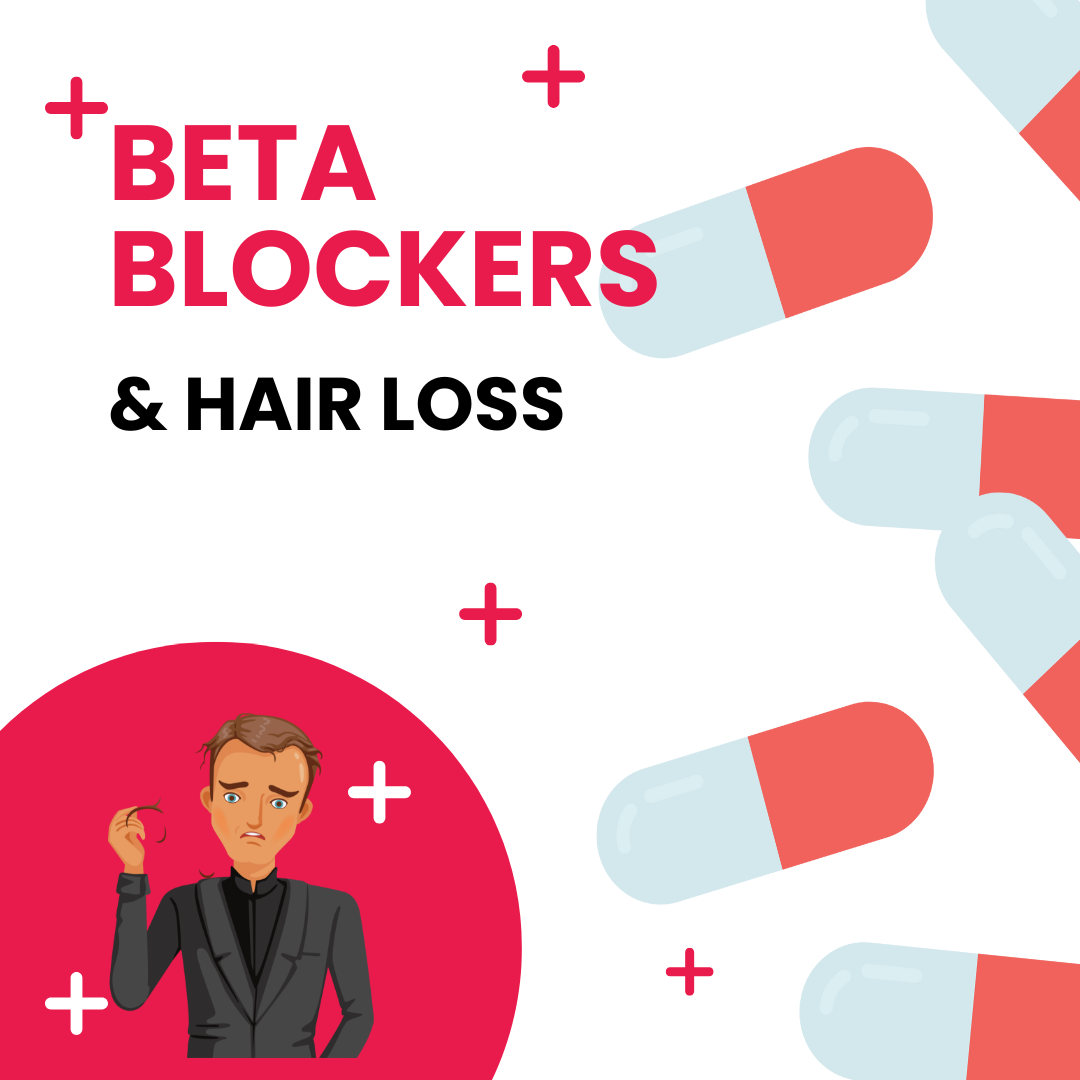Beta-blockers are a widely used class of medications prescribed for managing various cardiovascular conditions, including hypertension, angina, and arrhythmias. While effective and generally well-tolerated, beta-blockers are associated with certain side effects, one of which is hair loss or thinning. This blog explores the relationship between beta-blockers and hair loss, examining the specific medications involved, underlying mechanisms, reversibility, and management strategies.
Beta-Blockers Linked to Hair Loss
Not all beta-blockers carry the same risk of causing hair loss. However, certain medications within this class have been more frequently associated with this side effect. These include:
| Beta-Blocker | Brand Name(s) | Frequency of Hair Loss |
|---|---|---|
| Timolol | Blocadren | Rare |
| Atenolol | Tenormin | Rare |
| Metoprolol | Lopressor, Toprol XL | Rare but reported post-market |
| Nadolol | Corgard | Rare |
| Propranolol | Inderal, Inderal LA | Most commonly reported |
Among these, propranolol and metoprolol are most frequently cited in patient reports related to hair loss. It is worth noting that clinical trials for some beta-blockers, such as metoprolol, did not initially identify hair loss as a common side effect. However, post-market surveillance has revealed rare cases of reversible hair thinning.
Mechanisms Behind Beta Blocker-Induced Hair Loss
The primary mechanism by which beta-blockers cause hair loss is through a condition called telogen effluvium. This occurs when a significant number of hair follicles prematurely enter the resting (telogen) phase of the hair growth cycle. Normally, only 10-15% of hair follicles are in this phase at any given time. However, beta-blockers can act as stressors, disrupting the normal cycle and leading to increased shedding.
Key points about telogen effluvium:
- Hair shedding typically begins 2-4 months after starting beta-blocker therapy.
- The condition is temporary and reversible once the triggering factor (the medication) is removed.
In addition to telogen effluvium, other mechanisms may contribute to hair loss:
- Hormonal Interference: Beta-blockers may disrupt hormone production necessary for healthy hair growth.
- Direct Toxicity: For propranolol specifically, a direct toxic effect on hair follicles has been suggested.
- Premature Transition: Medications like metoprolol may cause active growth-phase (anagen) follicles to prematurely enter the resting phase.
Reversibility of Hair Loss caused by Beta-Blockers
The good news is that hair loss caused by beta-blockers is generally temporary and reversible:
- Once the medication is discontinued, hair follicles resume their normal growth cycle.
- Full regrowth may take 12-18 months depending on individual factors such as overall health and duration of medication use.
Although rare cases of permanent hair loss have been reported with other medications, such outcomes are exceedingly uncommon with beta-blockers.
Managing Beta-Blocker-Induced Hair Loss
If you experience hair thinning while on beta-blockers, consider the following steps:
1. Consult Your Doctor
- Discuss alternative medications or dosage adjustments.
- Switching to another class of drugs (e.g., calcium channel blockers or angiotensin II receptor blockers) may reduce the risk of hair loss.
2. Topical Treatments
- Visit Derma Clinic Kathmandu or Dermatologist in your area for suitable topical treatments.
3. Dietary and Lifestyle Modifications
- Ensure a balanced diet rich in vitamins and minerals like biotin, iron, and vitamin D.
- Manage stress levels through relaxation techniques or therapy.
4. Advanced Therapies
- Low-level laser therapy can improve blood flow to the scalp.
- In severe cases where regrowth does not occur naturally, options like hair transplant surgery may be explored.
5. Check for Deficiencies
- Address underlying deficiencies (e.g., vitamin D or iron) that could exacerbate hair loss.
Alternative Medications
For those who cannot tolerate beta-blockers due to hair loss concerns, alternative treatments include:
| Medication Class | Examples | Risk of Hair Loss |
|---|---|---|
| Calcium Channel Blockers | Amlodipine, Nifedipine | Very low |
| Angiotensin II Receptor Blockers (ARBs) | Losartan, Valsartan | Rare |
| ACE Inhibitors | Enalapril, Lisinopril | Occasionally reported |
Switching medications should always be done under medical supervision by cardiologist to ensure continued management of underlying health conditions.
Types of Hair Loss Associated with Beta-Blockers
The most common type of hair loss linked to beta-blockers is telogen effluvium, characterized by diffuse thinning rather than patchy baldness. In rare cases, alopecia areata (an autoimmune condition causing patchy hair loss) has been reported with propranolol use.
Understanding these distinctions is important for accurate diagnosis and treatment planning.
Conclusion
While beta-blocker-induced hair loss is relatively rare and typically reversible, it can still be distressing for those affected. Certain medications like propranolol and metoprolol are more commonly associated with this side effect due to their potential to disrupt the normal hair growth cycle through telogen effluvium or other mechanisms. Fortunately, several management strategies are available, you need to seek help from dermatologist and cardiologist for it.
If you suspect your beta-blocker is contributing to hair thinning, consult your healthcare provider promptly to explore alternatives or supportive treatments. With proper care and guidance, most individuals can achieve full recovery from this temporary side effect while continuing effective cardiovascular management.Also contact Derma Clinic Kathmandu to start hair loss treatment.

